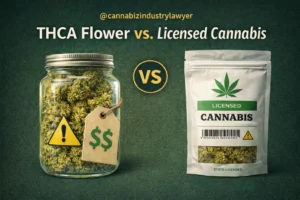If you’re a cannabis entrepreneur in Kentucky, you may be wondering how to open a dispensary in Kentucky. In this short blog post we will keep you posted on what you needed to know to apply for a Kentucky dispensary license in 2024.
Here’s what you need to know about opening a dispensary in Kentucky:
 With the legalization of medical marijuana in Kentucky, many entrepreneurs are gearing up to open their own dispensaries in the state. However, the process can be overwhelming, especially for those who are new to the industry. From obtaining the necessary licenses to understanding state regulations, there is a lot to consider before launching a successful dispensary. In this blog post, we’ll provide you with all the information you need to know about opening a medical marijuana dispensary in Kentucky.
With the legalization of medical marijuana in Kentucky, many entrepreneurs are gearing up to open their own dispensaries in the state. However, the process can be overwhelming, especially for those who are new to the industry. From obtaining the necessary licenses to understanding state regulations, there is a lot to consider before launching a successful dispensary. In this blog post, we’ll provide you with all the information you need to know about opening a medical marijuana dispensary in Kentucky.
Kentucky’s Medical Cannabis: May 2024 Update
Kentucky’s medical cannabis market is set to explode, with applications for licenses opening on July 1st, 2024! This definitive guide empowers you, whether you’re a seasoned cannabis professional or a fresh entrepreneur, to conquer the Kentucky Cannabis License application process.
Key Dates & Crucial Info
- Applications Accepted: July 1st, 2024
- License Selection: Random lottery awards 76 total licenses in 2024
- Social Equity: No specific social equity requirements at this time
- Dispensary Openings Expected: 2025
Kentucky Cannabis License Types
Kentucky offers a diverse range of licenses to perfectly align with your business goals. Here’s a breakdown of your options and associated fees:
- Cultivation Licenses:
- Tier I (grow space under 2,500 sq ft): $3,000
- Tier II (up to 10,000 sq ft): $10,000
- Tier III (up to 25,000 sq ft): $20,000
- Tier IV (up to 50,000 sq ft): $30,000 (No licenses offered in 2024)
- Processing License: $5,000
- Dispensary License: $3,000 (with quotas: 4 per rural region, 6 in Louisville & Lexington regions)
- Producer License (cultivation & processing): Cultivation tier fee applies, plus $5,000
- Safety Compliance Facility License: $3,000 (unlimited licenses)
The Kentucky Cannabis License Application
The application process requires you to demonstrate your qualifications. Here’s what you’ll need to have in order:
- Solid Funding: Secure access to at least $150,000 in funding for each region you apply in, with a unique funding source required for each region.
- Secured Location: A lease agreement, purchase agreement, or deed for your facility is mandatory. The location must comply with zoning and be at least 1,000 feet from schools/daycares.
- Ownership Transparency: Provide comprehensive details for all owners, including name, date of birth, CV/resume, contact information, and address. Documentation showcasing business experience in Kentucky or the cannabis industry is a must-have.
- Medical Professional Disclosures: Disclose financial information for any proposed financial backers and involved medical professionals.
- Business Plans & Documents: Submit your Articles of Incorporation, Bylaws, and other relevant formation documents.
- Operational Plans: Develop detailed plans covering job descriptions, operational timeline, financial plan, security measures, transportation, storage & inventory management, recordkeeping, diversion prevention, and workforce development.
Navigating Kentucky’s Regions for Strategic Advantage

How to open a dispensary in Kentucky, the requirements
If you’re an entrepreneur looking to open a dispensary in Kentucky, there are some legal requirements you need to be aware of. Here are the basics:
- Licenses and permits: Before you can open a dispensary, you’ll need to apply for a license from the Kentucky Department of Public Health. You’ll also need to obtain any necessary local permits from your city or county. You must pay the licensing fee each year as it is an annual license.
- Location: There are strict rules about where dispensaries can be located in Kentucky. They must be at least 1,000 feet from schools, public parks, and libraries. Additionally, dispensaries cannot be located in areas that are considered residential or agricultural zones.
- Security: Dispensaries must have strict security measures in place, including surveillance cameras, security alarms, and a secure storage area for cannabis products, including recall plans in place.
- Product testing: All cannabis products sold at dispensaries must be tested by a state-approved laboratory to ensure their safety and potency.
- Staff training & Recordkeeping: Dispensary employees must be trained on the safe and responsible use of cannabis, as well as the laws and regulations surrounding its sale, and comply with all recordkeeping regulations promulgated by the Cabinet for Health and Family Services, which publication of draft regulations began in early 2024.
- Taxes: Dispensaries must pay a 6% sales tax on all cannabis products sold.
It’s important to note that these requirements are subject to change, so be sure to stay up-to-date on any new regulations or guidelines that may be implemented. Additionally, it’s a good idea to consult with an attorney who specializes in cannabis law to ensure that you’re fully compliant with all state and local regulations.
How much does it cost to open a dispensary in Kentucky?
Opening a cannabis dispensary in Kentucky can be a profitable business venture, but it also requires a significant investment. The cost of opening a dispensary in Kentucky can vary depending on several factors, including location, size, and the type of products you plan to sell. Here’s a breakdown of the estimated costs you can expect when opening a dispensary in Kentucky.
1. License and Permit Fees
The first cost you’ll need to consider when opening a dispensary in Kentucky is the license and permit fees. The state of Kentucky currently has not set its application fees for a dispensary license, but such rules are expected later in 2024. Other states charge as little as $250 dollars to apply for license lotteries, while some highly regulated medical states charge over $100,000 just to apply for a medical cannabis license. Stay tuned to this page and Kentucky’s official websites to discover what the application fee alone will be.
Professional services for the application require advisors to write up all the agreements and SOPs your business needs. These costs can be over $100,000 in competitive jurisdictions that require a hundreds of pages long application to win the dispensary license.
2. Real Estate and Lease Costs
Finding the right location for your dispensary is important, and it can also be one of the most expensive aspects of opening a dispensary in Kentucky. You’ll need to consider the size, location, and accessibility of your dispensary. Renting a suitable space in a high-traffic area can cost between $5,000 to $10,000 per month.
3. Inventory Costs
The cost of your inventory will also depend on the products you plan to sell. You’ll need to stock up on a variety of strains, edibles, concentrates, and other cannabis-related products. Depending on the size of your dispensary, you can expect to spend anywhere from $50,000 to $500,000 on inventory.
What kind of license do I need to open a dispensary in Kentucky?
To start, you’ll need to submit an application to the Kentucky Cabinet for Health and Family Services’ Department of Public Health. This application will require you to provide detailed information about your business plan, financial projections, and security measures. You’ll also need to undergo a criminal background check and prove that you have the financial resources to operate a dispensary.
There are two types of licenses available in Kentucky for medical marijuana dispensaries: one for cultivation and one for dispensing. If you plan to grow your own cannabis, you’ll need a cultivation license. If you plan to purchase cannabis from licensed growers and sell it to patients, you’ll need a dispensing license.
The application process for both licenses is similar, but there are some key differences. For example, a cannabis cultivator license require more extensive security measures than dispensing licenses, since you’ll be growing and storing a large amount of cannabis on site.
Once you’ve obtained a license, you’ll need to follow strict regulations related to inventory tracking, packaging and labeling, and patient confidentiality. You’ll also need to renew your license annually and undergo regular inspections to ensure compliance with state regulations.
In summary, opening a dispensary in Kentucky requires a significant investment of time, money, and resources. However, for
What kind of products can be sold in a dispensary in Kentucky?
If you’re an aspiring cannabis entrepreneur in Kentucky, it’s essential to understand what products you can sell in a dispensary. In Kentucky, medical marijuana has been legalized, so dispensaries can sell a limited range of products to patients who have obtained a medical marijuana card. Here’s a rundown of the products that can legally be sold in a dispensary in Kentucky:
1. Flower/Strains: Dispensaries can sell cannabis flower or “bud” to patients. Buyers can choose from a variety of strains with different THC and CBD levels – with a 35% THC limit.
2. Edibles: Dispensaries can sell a range of cannabis-infused edibles, including gummies, chocolates, baked goods, and more. Edibles are a discreet and convenient alternative to smoking.
3. Tinctures: Tinctures are cannabis extracts infused with alcohol or glycerin. They are taken sublingually (under the tongue) and provide a quick onset time.
4. Topicals: Topicals are cannabis-infused creams, salves, and lotions that are applied to the skin. They’re commonly used for pain relief.
5. Vape cartridges: Vape cartridges contain cannabis oil and are used with a vape pen. They offer a discreet method of consumption and are often preferred by patients who don’t want to inhale smoke.
It’s worth noting that Kentucky’s medical marijuana program is still in its early stages, and regulations are subject to change. As a dispensary owner, you’ll need to stay up-to-date on any new developments in the industry, so you can adapt your business accordingly.
How can I find out more information about opening a dispensary in Kentucky?
If you’re an entrepreneur looking to open a cannabis dispensary in Kentucky, you may be wondering where to start. Fortunately, there are several resources available that can help you navigate the process and ensure that you’re up to speed on all the relevant laws and regulations.
One of the best places to start is the Kentucky Department of Public Health, which oversees the state’s medical cannabis program. Their website provides detailed information on the requirements for opening a dispensary, including licensing, inspections, and security measures.
Another great resource is the Kentucky Cannabis Industry Association, which is a trade group dedicated to advancing the interests of cannabis businesses in the state. They offer a wealth of information on the industry, including legal updates, networking opportunities, and educational resources.
In addition, it’s a good idea to consult with an attorney who specializes in cannabis law. They can help you navigate the complex regulations and ensure that you’re in compliance with all state and federal laws.
Finally, you may want to consider attending industry conferences and events to network with other entrepreneurs and learn more about the latest trends and best practices in the cannabis industry.
In summary, opening a cannabis dispensary in Kentucky requires careful planning and a thorough understanding of the regulatory landscape. By leveraging the resources available to you, you can ensure that your business is set up for success.
Are there any restrictions on where dispensaries can be located in Kentucky?
Yes, there are restrictions on where dispensaries can be located in Kentucky. According to the Kentucky Department of Public Health, dispensaries can only be located in areas that are zoned for commercial or industrial use. Dispensaries must be at least 1,000 feet away from schools, public parks, and libraries. Additionally, dispensaries cannot be located in areas that are considered residential or agricultural zones.
It’s important to note that local governments may also have their own zoning regulations for dispensaries, so it’s essential to research the specific location where you plan to open your dispensary. It’s recommended to work closely with local officials and community members to ensure that your dispensary is compliant with all regulations and is a good fit for the community.
In summary, there are restrictions on where dispensaries can be located in Kentucky, so it’s crucial to do your research and work with local officials to ensure you’re following all regulations and zoning requirements. By doing so, you can help ensure the success of your dispensary and contribute to the growth of the cannabis industry in Kentucky.
Conclusion of How to open a Dispensary in Kentucky.
In conclusion, learning how to open a dispensary in Kentucky can be a rewarding and lucrative business venture, but it requires careful planning and preparation. By following the steps outlined in this article and seeking guidance from industry professionals, you’ll be on your way to building a successful and compliant dispensary. Remember to prioritize the needs of your patients and community, and always stay informed about the latest regulations and products in the industry. Good luck on your journey to becoming a cannabis entrepreneur in Kentucky!




